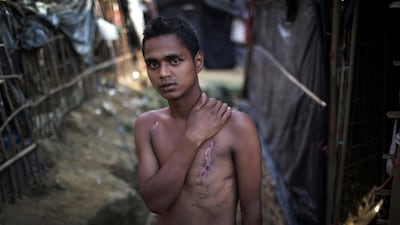The United States blacklisted a rogues’ gallery of alleged rights abusers and corrupt officials on Thursday, including a top Myanmar general for his role in atrocities against Rohingya Muslims.
The Trump administration announced penalties against 14 people worldwide in total. Along with Myanmar's Maung Maung Soe, they included an Israeli mining mogul, Gambia's former president, a pop star and Uzbek dictator’s daughter, and the son of Russia's prosecutor-general.
The sanctions were the first set imposed under the Global Magnitsky Human Rights Accountability Act, passed by Congress last year, that empowers the Treasury Department to target officials anywhere for human rights violations and corruption.
The inclusion of Myanmar's Maung Maung Soe on the list was perhaps the most dramatic move in US foreign policy. Washington progressively eased economic and political sanctions against Myanmar starting in 2012 to reward the country's shift toward democracy after decades of military rule. Ties expanded further as Nobel Peace laureate Aung San Suu Kyi rose to power.
But the relationship has soured since Myanmar's crackdown in Rakhine province, which has forced 630,000 Muslim Rohingya to flee to neighbouring Bangladesh. Maung Maung Soe was until last month the military commander in Rakhine, and the US said he was responsible for leading a campaign of "ethnic cleansing" against the Rohingya people, including credible evidence of mass killings, rapes and villages being burned.
Other prominent individuals punished Thursday include:
- Dan Gertler, an Israeli mining billionaire who made his fortune in the Democratic Republic of Congo. Mr Gertler is known for his close friendship with president Joseph Kabila and, according to the report, “amassed his fortune through hundreds of millions of dollars of opaque and corrupt mining and oil deals” in the Congo.
- Gulnara Karimova, the daughter of the late Uzbek strongman Islam Karimov, and allegedly an organised crime boss in her own right. Ms Karimova has been charged at home with theft and embezzlement and the US statement alleged she has laundered her network's profits in a web of companies and funds.
- Yahya Jammeh, Gambia's former president. He is alleged to have created an armed squad known as "the Junglers" that terrorised and killed numerous political foes, including religious leaders, journalists and dissidents, while he was in power from 1994 to 2017. Mr Jammeh is also accused of plundering his country's treasury by stealing at least $50 million in state funds.
- Artem Chayka, the son of the Prosecutor General of the Russian Federation who, it is claimed, “leveraged his father’s position and ability to award his subordinates to unfairly win state-owned assets and contracts and put pressure on business competitors”.
The blacklist also includes officials and businessmen from China, Guatemala, Pakistan, Serbia and the Dominican Republic.
"Today's actions advance our values and promote the security of the United States, our allies and our partners," US Secretary of State Rex Tillerson said.
"We must lead by example, and today's announcement of sanctions demonstrates the United States will continue to pursue tangible and significant consequences for those who commit serious human rights abuse and engage in corruption."
The global act, based on a previous US law that targeted Russian officials, was passed in late 2016 and officials have spent a year compiling the first list.
Just as the list of Russians under US sanctions has expanded regularly since the Magnitsky Act of 2012, the new global blacklist is also expected to grow.
Under the law, US citizens and institutions are forbidden from conducting business with those on the list, and any assets they hold under US jurisdiction are frozen.
In addition, officials said, non-US foreign banks are often loathe to do business with blacklisted individuals in case their own US operations are exposed to prosecution.
"The United States is taking a strong stand against human rights abuse and corruption globally," Treasury Secretary Steven Mnuchin said.
"The Treasury ... will continue to take decisive and impactful actions to hold accountable those who abuse human rights, perpetrate corruption, and undermine American ideals."

